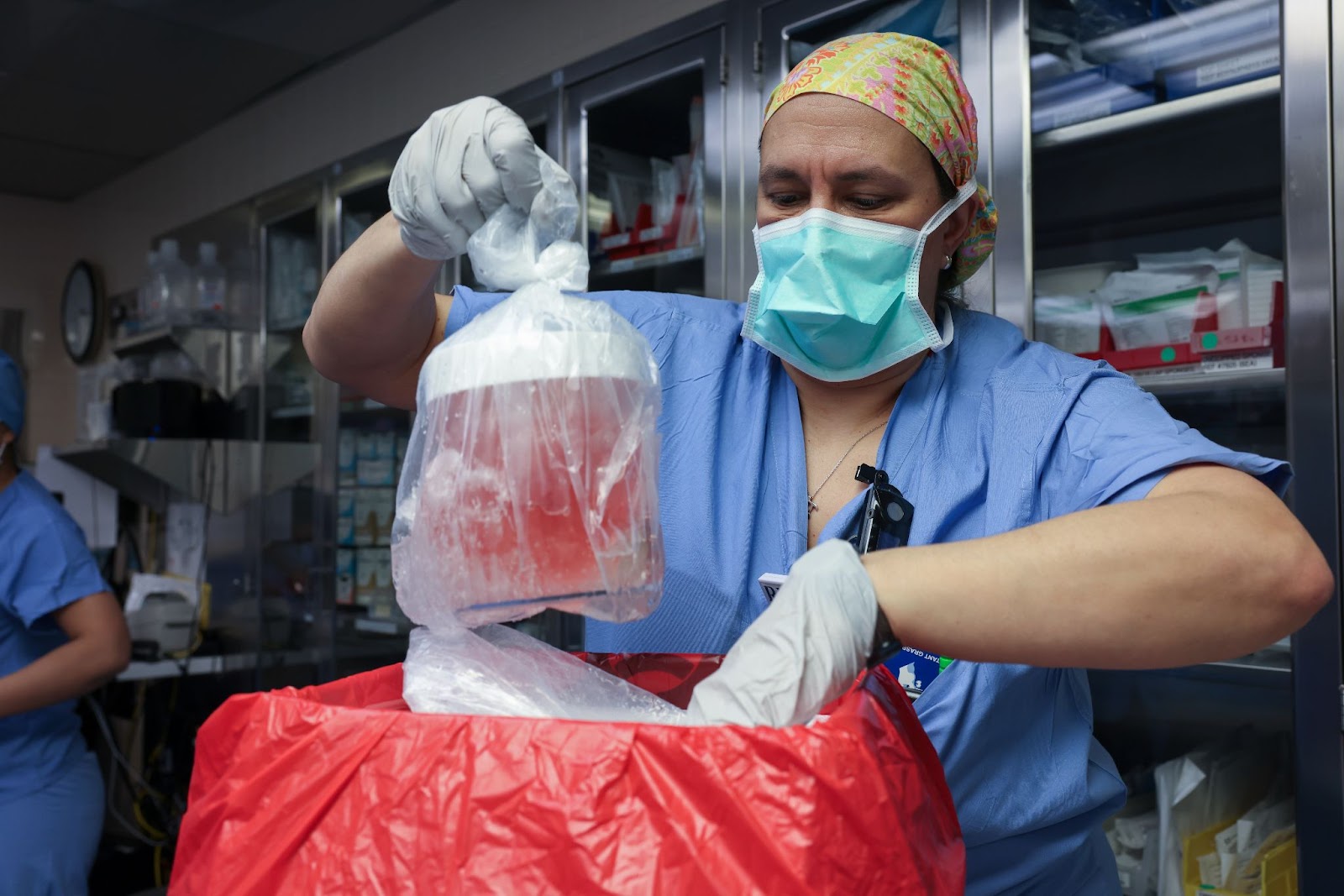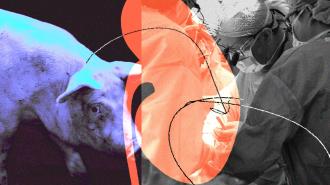A gene-edited pig kidney has been successfully transplanted into a person for the first time, doctors report.
“Our hope is that this transplant approach will offer a lifeline to millions of patients worldwide who are suffering from kidney failure,” said study co-leader Tatsuo Kawai.
The patient: Richard ‘Rick’ Slayman had been living with type 2 diabetes and high blood pressure for years when his doctors determined that he was going to need to go on dialysis — his kidneys were no longer functioning well enough for him to survive without it.
“I saw it not only as a way to help me, but a way to provide hope for the thousands of people who need a transplant to survive.”
Richard ‘Rick’ Slayman
In 2018, after eight years of dialysis, he was lucky enough to undergo a kidney transplant that freed him from the machines. By 2023, though, his donor kidney was no longer working, and when he went back on dialysis, it wasn’t working either — recurrent complications accessing his blood vessels were forcing him into the hospital every two weeks for interventions.
“At one point, he told me he thought he would not be able to go on,” Winfred Williams, Slayman’s primary kidney doctor, said during a press conference on March 21. “He literally said, ‘I don’t think I can go on like this. I don’t want to go on like this.’”
A radical idea: Ultimately, Williams and the team at Mass General Transplant Center suggested an unprecedented experimental treatment: a gene-edited pig kidney transplant. Slayman decided to go for it.
“I saw it not only as a way to help me, but a way to provide hope for the thousands of people who need a transplant to survive,” he said.
After securing approval through the FDA’s compassionate use protocol, Mass General surgeons transplanted the gene-edited pig kidney into their 62-year-old patient on March 16. The procedure took four hours and involved a 15-person medical team.
On March 21, the hospital reported that the organ is functioning, so far, and that Slayman was “recovering well” and no longer on dialysis. The expectation is that he will be discharged from the hospital soon.
The big picture: If Slayman hadn’t opted for the pig kidney, he would have likely had to wait years for another human kidney to become available, if one ever did — the demand for kidneys vastly exceeds the supply.
Researchers have long hoped that organs from animals could work in humans, but it’s hard enough to avoid rejection with human organ transplants, and historically, all attempts to transplant animal organs into people have ended in failure.
Modern gene editing tech could change that, though.
The pig kidney used for Slayman’s transplant was provided by eGenesis, a biotech company that is genetically engineering pigs to have organs that are more compatible with humans and less likely to be rejected by the human immune system.
The company uses CRISPR to knock out three pig genes that are likely to cause rejection, add in seven human genes to make the organs more acceptable to the human body, and inactivate the remnants of viruses that have become embedded in the pig genome, which could cause problems in people.
In 2023, eGenesis announced that one monkey had survived for more than two years with one of its gene-edited pig kidneys (although it was the best outcome of the 15 monkeys in the trial). In January 2024, it reported that a pig liver attached to the body of a person who was brain dead and on life-support successfully filtered their blood for 72 hours.
A team in China just reported that it fully transplanted a pig liver created by Clonorgan Biotechnology, another company developing gene-edited pig organs, into the body of a clinical brain dead man and saw it function well for 10 days.
Meanwhile, Revivicor, yet another company working in this space, has produced pig kidneys that were transplanted into the bodies of people who were brain dead, with very promising results. It has also provided pig hearts for transplantation into two patients with heart failure.

While the pig hearts were functional for a time, both recipients died within about two months of their transplant operations. The Mass General team says it has several reasons to believe Slayman will have a better outcome, though.
A major one is that both heart transplant recipients were extremely sick by the time they underwent the transplants — they were living at the hospital and doctors had determined their cases were terminal. Slayman may have been experiencing serious health problems at the time of the surgery, with a difficult prognosis, but he was also healthy enough to live at home and hold down a job.
“Mr. Slayman is actually quite robust even though he’s been on dialysis for years,” said Williams, who noted that the fact that Slayman needed a kidney and not a heart is also working in his favor.
“In the preclinical research that’s done in the kidney model, the survival of the organ really is much more robust and for a longer period than the heart models,” said Williams.
“Mr. Slayman becomes a beacon of hope for countless individuals.”
Joren C. Madsen
Looking ahead: The preclinical research may be promising, but the only way to know for sure how well a gene-edited pig kidney will perform in humans is to try it.
Now that Slayman has volunteered to be that first person, it won’t be long before we have a better idea of the potential for pig organs to usher in a new era in transplantation — around the world, millions of people are living with kidney disease and renal failure, and as populations age, the problem is only likely to grow.
“As the global medical community celebrates this monumental achievement, Mr. Slayman becomes a beacon of hope for countless individuals suffering from end-stage renal disease and opens a new frontier in organ transplantation,” said Joren C. Madsen, director of the Transplant Center.
We’d love to hear from you! If you have a comment about this article or if you have a tip for a future Freethink story, please email us at [email protected].





